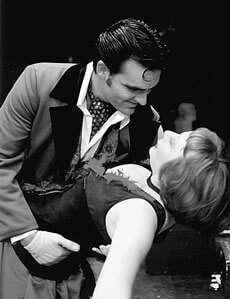Jean Cocteau Rep tackles risky classic with clarity, talent
Has there ever been a time when “The Threepenny Opera” hasn’t been relevant to a contemporary political situation?
The story of cynical machinations of civilians and government officials to achieve selfish ends is always timely, given human nature. Certainly in our culture rife with corporate and political corruption, the story of the society made up of a bunch of 19th century beggars and robbers offers today’s audience ample material for easy metaphors.
On revisiting the show, now in a revival of its recent production by the Jean Cocteau Repertory, one also can’t avoid the purity of the writing and the focus of its abstract, yet unerring, eye on the soul’s corruption.
Marc Blitzstein’s translation of the Bertolt Brecht/Kurt Weill classic, is razor sharp in its language and has that wonderful ability to seem timeless without being stilted. The show also succeeds in something that eludes many of today’s social critics—it achieves searing criticism without stridency, and, thus, unlike a movie like “Fahrenheit 9/11” has the potential to be more chilling.
Rather than building a courtroom style case, always subject to challenge based on the facts in evidence and their presentation, “Threepenny” invokes a visceral response. Brecht and Weill’s villains and heroes are both sympathetic and likeable, which makes moral clarity far more complex. The polarization of opinion fostered by today’s media seems less authentically honest and more theoretical than this piece of theater. In a world of absolutes, and particularly one as drenched in media shrillness as our own, it is far too easy to turn away from the images and messages an individual doesn’t want to hear. It is more difficult to turn away from evil when it comes in a sexy package—as Macheath does in “Threepenny.”
Given this wonderful material and rich context, it’s disappointing that the Cocteau’s production directed by David Fuller is not as deep as it might be. When it works, it’s spellbinding, but when it does not, the energy collapses onto itself and the production falls into that same level of stridency that injures Michael Moore’s movie. Fuller directed his cast to start out at a level of intensity and anger that really gives them nowhere to go. There is no gradual building of tension or emotion throughout, so that when the deus ex machina ending happens, the feeling is one of ironic comedy rather than horror at how corruption starts at the top. Fuller needs to trust his audience more to make the connections and focus on building believable characters and drama.
There is, however, much to applaud in this production. For one, the company is extremely talented. The voices are generally superlative, which is delightful in the theater’s small space. The actors consistently have both the talent and technique to deliver the complex numbers, and the skill of music director Charles Berigan shows as much in the solo numbers as in the choral work. There is a clarity about the music in this production that is often missing from this show, which is a crucial plus since Brecht and Weill leave no room for imprecision.
In particular, Chad A. Suitts as Macheath is totally in command of the role, finding the perfect balance of creepiness and sex appeal that makes “Mack the Knife” so powerful—and explains why his amorality and corruption are so attractive. Stephanie Lunge as Polly Peachum has a wonderful, powerful voice and delightful presence as a refined lady with a streak of debauched criminality. Lorinda Lisitza is terrific as the prostitute Jenny with her shocking attitudes and malevolent welstschmerz, and Natalie Ballesteros as Lucy Brown scores with her rich portrayal of the most stock character in the piece.
The production is also notable for its amazing design. The scenery by Roman Tatarowicz somehow manages to convey the scope of 19th century London’s underworld within the confines of a very small stage, a feat of engineering and design magic that is astonishing. Costumes by Joanne Haas are perfect and the lighting design by Giles Hogya similarly makes maximum use of minimum space, which gives the production an appropriate and strong emotional punch.
Few theater companies are willing to produce a show as risky as “Threepenny Opera.” Aside from the opening number, “Mack the Knife,” there are few crowd pleasers so this is not your traditional musical. Yet even when it doesn’t fulfill its promise, this production demands respect on many levels and underscores the validity of the Jean Cocteau’s commitment to keeping these important pieces of theater alive.


































